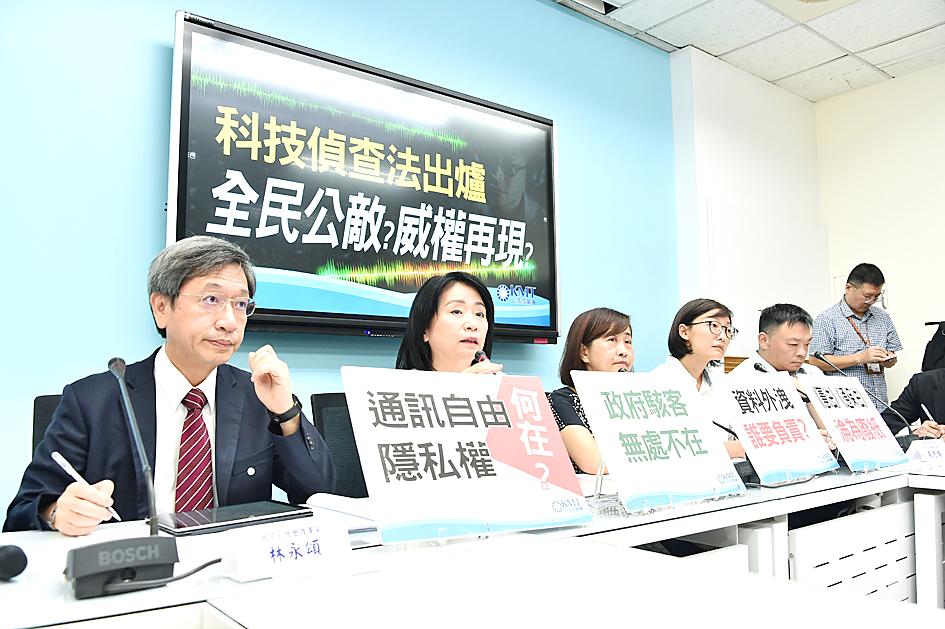The nation needs to deal with new forms of digital crimes by providing law enforcement agencies with tools powered by new technologies, a Ministry of Justice (MOJ) official said yesterday in defense of a draft “technological investigation act.”
Chinese Nationalist Party (KMT) members and some legal experts have condemned the draft act as going backward and infringing on personal privacy rights.
The KMT caucus in a news conference at the Legislative Yuan in Taipei called on its members to block the draft act, saying that the government is heading for authoritarian rule and is violating the basic rights of its citizens.

Photo: Tu Chien-jung, Taipei Times
The proposed law could also be used as a tool for political persecution, it said.
“We are worried about pervasive surveillance of interpersonal communications. People will live under constant surveillance by the government’s judicial agencies. We believe there is no need for this draft act,” KMT caucus secretary-general Lin Yi-hua (林奕華) said.
“The limitations must be defined clearly, even on investigating criminal cases, and the main principle should be minimal infringement of personal privacy,” Judicial Reform Foundation chairman Joseph Lin (林永頌) said.
The goals for the draft act can be achieved by amending the Communication Security and Surveillance Act (通訊保障及監察法), he added.
Department of Prosecutorial Affairs Deputy Director Lee Hao-sung (李濠松) told the news conference that the draft act is needed to keep up with new technologies.
“We can review its provisions and make adjustments, as our ministry has the obligation to consult with the public, in line with the government’s insistence on openness and transparency,” Lee said.
“The draft act is aimed at criminals. It is not to be used on the general public, nor will it be used in investigating political cases,” he said.
“We have to deal with new forms of digital crimes in cyberspace, so we need new ways of investigation,” Lee said.
He cited a case from 2017 in which a Coast Guard Administration official installed a GPS tracking device on a boat to investigate allegations of drug smuggling, but was sued by the defendants.
The Supreme Court eventually convicted the official for violating personal privacy, he added.
“It has been found that most of the communications for selling illegal drugs are done through [the messaging app] Line,” Lee said. “However, Line Corp is an Internet service company, not a telecom, and does not have telecommunications hardware equipment on which to install a wiretap. Therefore, under current law, judicial investigators are not permitted to listen in on Line conversations, or see its content.”
“Under the draft act, our ministry would assess varying needs for surveillance. In cases involving lesser infringements of privacy, we could authorize prosecutors for an investigation. For those with more severe infringements, we would need to obtain approval from a court,” he said.

A preclearance service to facilitate entry for people traveling to select airports in Japan would be available from Thursday next week to Feb. 25 at Taiwan Taoyuan International Airport, Taoyuan International Airport Corp (TIAC) said on Tuesday. The service was first made available to Taiwanese travelers throughout the winter vacation of 2024 and during the Lunar New Year holiday. In addition to flights to the Japanese cities of Hakodate, Asahikawa, Akita, Sendai, Niigata, Okayama, Takamatsu, Kumamoto and Kagoshima, the service would be available to travelers to Kobe and Oita. The service can be accessed by passengers of 15 flight routes operated by

MORE FALL: An investigation into one of Xi’s key cronies, part of a broader ‘anti-corruption’ drive, indicates that he might have a deep distrust in the military, an expert said China’s latest military purge underscores systemic risks in its shift from collective leadership to sole rule under Chinese President Xi Jinping (習近平), and could disrupt its chain of command and military capabilities, a national security official said yesterday. If decisionmaking within the Chinese Communist Party has become “irrational” under one-man rule, the Taiwan Strait and the regional situation must be approached with extreme caution, given unforeseen risks, they added. The anonymous official made the remarks as China’s Central Military Commission Vice Chairman Zhang Youxia (張又俠) and Joint Staff Department Chief of Staff Liu Zhenli (劉振立) were reportedly being investigated for suspected “serious

Taiwanese and US defense groups are collaborating to introduce deployable, semi-autonomous manufacturing systems for drones and components in a boost to the nation’s supply chain resilience. Taiwan’s G-Tech Optroelectronics Corp subsidiary GTOC and the US’ Aerkomm Inc on Friday announced an agreement with fellow US-based Firestorm Lab to adopt the latter’s xCell, a technology featuring 3D printers fitted in 6.1m container units. The systems enable aerial platforms and parts to be produced in high volumes from dispersed nodes capable of rapid redeployment, to minimize the risk of enemy strikes and to meet field requirements, they said. Firestorm chief technology officer Ian Muceus said

Alain Robert, known as the "French Spider-Man," praised Alex Honnold as exceptionally well-prepared after the US climber completed a free solo ascent of Taipei 101 yesterday. Robert said Honnold's ascent of the 508m-tall skyscraper in just more than one-and-a-half hours without using safety ropes or equipment was a remarkable achievement. "This is my life," he said in an interview conducted in French, adding that he liked the feeling of being "on the edge of danger." The 63-year-old Frenchman climbed Taipei 101 using ropes in December 2004, taking about four hours to reach the top. On a one-to-10 scale of difficulty, Robert said Taipei 101